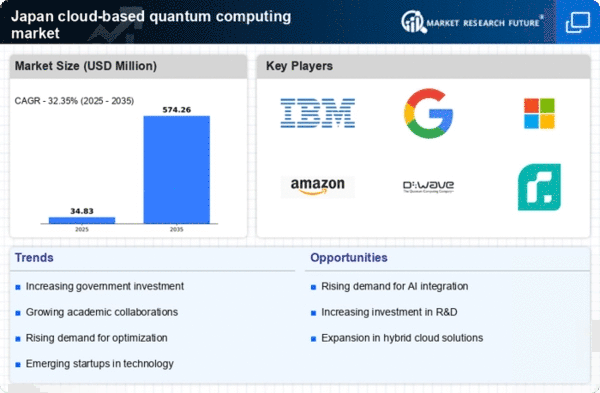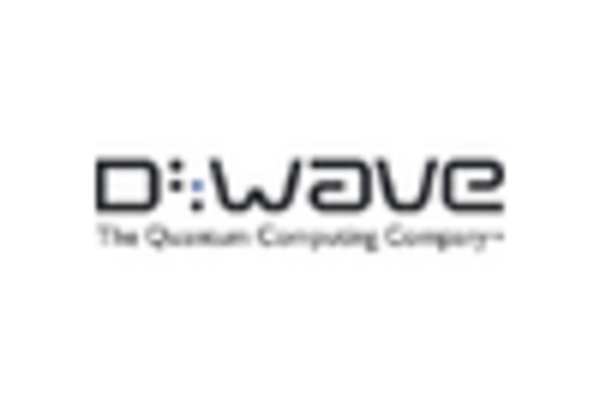Investment in Research and Development
Investment in research and development (R&D) is a critical driver for the cloud based-quantum-computing market in Japan. The government and private sector are increasingly allocating funds to explore innovative quantum technologies and applications. This investment is essential for fostering breakthroughs in quantum algorithms, hardware, and software, which are vital for the market's growth. In 2025, R&D spending in the quantum sector is expected to exceed $500 million, highlighting the commitment to advancing quantum capabilities. Such investments not only enhance the technological landscape but also attract talent and expertise, further propelling the cloud based-quantum-computing market forward.
Strategic Partnerships and Collaborations
Strategic partnerships and collaborations among technology firms, research institutions, and universities are emerging as a significant driver for the cloud based-quantum-computing market in Japan. These alliances facilitate knowledge sharing, resource pooling, and the development of innovative solutions. For instance, collaborations between tech giants and academic institutions have led to the creation of specialized quantum research centers. Such initiatives are expected to enhance the ecosystem, enabling faster advancements in quantum technologies. The collaborative efforts may result in a more robust market, with projections indicating a potential market size of $2 billion by 2030, driven by these synergistic relationships.
Growing Interest in Quantum Security Solutions
The increasing focus on cybersecurity is propelling the cloud based-quantum-computing market in Japan, particularly in the realm of quantum security solutions. As cyber threats evolve, organizations are seeking advanced security measures that quantum computing can provide. Quantum key distribution (QKD) and other quantum encryption methods are gaining traction as they offer unprecedented levels of security. The market for quantum security solutions is anticipated to grow at a CAGR of 30% over the next five years, reflecting the urgency for enhanced protection against cyber threats. This growing interest underscores the potential of quantum technologies to address critical security challenges in the digital landscape.
Rising Demand for Advanced Computing Solutions
The cloud based-quantum-computing market in Japan is experiencing a notable surge in demand for advanced computing solutions. This demand is driven by the need for enhanced processing capabilities to tackle complex problems across various sectors, including finance, healthcare, and logistics. As organizations seek to leverage quantum computing for optimization and simulation tasks, the market is projected to grow significantly. According to recent estimates, the market could reach a valuation of approximately $1 billion by 2027, reflecting a compound annual growth rate (CAGR) of around 25%. This trend indicates a robust interest in cloud based-quantum-computing technologies, as businesses recognize their potential to revolutionize traditional computing paradigms.
Educational Initiatives and Workforce Development
Educational initiatives aimed at developing a skilled workforce are crucial for the cloud based-quantum-computing market in Japan. As the demand for quantum computing expertise rises, universities and training institutions are introducing specialized programs to equip students with the necessary skills. These initiatives are expected to produce a new generation of quantum scientists and engineers, fostering innovation in the field. By 2026, it is projected that the number of graduates in quantum-related disciplines will increase by 40%, addressing the skills gap in the industry. This focus on education and workforce development is likely to enhance the overall capacity of the cloud based-quantum-computing market, ensuring its sustainable growth.
















